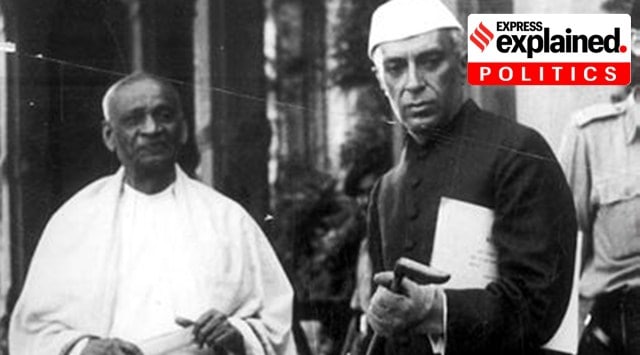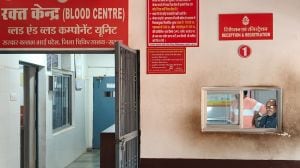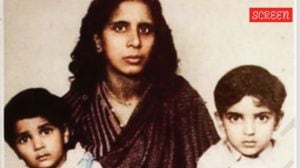December 15 is the death anniversary of Sardar Vallabhbhai Patel, first Home Minister and among the chief architects of modern India.

Preparing for UPSC? Use CRACKUPSC20 code here to get an extra 20% discount on Indian Express subscription.
Unlike the other members of the ‘triumvirate’ that shaped independent India, Jawaharlal Nehru and Mahatma Gandhi, Sardar Patel, ever the man of action, does not leave behind copious writings on his views and beliefs. This has often led to muddled debates on what the lifelong Congressman stood for. However, the Sardar did make a number of public speeches in his long political career, which have been collected and published. These, along with his letters, and of course his actions, give a fairly detailed picture of his convictions and his aspirations for India.
Here are Patel’s views on three subjects that are as relevant today as they were to the nascent republic of India.
Sardar Patel’s views on RSS
Patel is often believed to be sympathetic to Hindutva causes, but it is important to see his views on the RSS holistically – while he did believe that many members of the RSS were patriotic and their energies could be used for the country’s welfare, he was clear they had to bow to the Constitution and could have no place in the official state apparatus.
Christophe Jaffrelot has written in The Indian Express, “On January 6, 1948, in a speech in Lucknow, he [Patel] invited the Hindu Mahasabha to amalgamate with the Congress. He held out the same invitation to members of the RSS, criticising Nehru obliquely: “In the Congress,those who are in power feel that by virtue of authority they will be able to crush the RSS. You cannot crush an organisation by using the danda [stick]. The danda is meant for thieves and dacoits. They are patriots who love their country. Only their trend of thought is diverted. They are to be won over by Congressmen with love.””
Story continues below this ad
The RSS, of course, was banned after the assassination of Mahatma Gandhi on January 30, 1948. The Home Ministry headed by Sardar Patel said in its communique announcing the ban, “…the cult of violence sponsored and inspired by the activities of the Sangh has claimed many victims. The latest and most precious to fall was Gandhiji himself. In these circumstances it is the bounden duty of the government to take effective measures to curb this re-appearance of violence in a virulent form and as a first step to this end, they have decided to declare the Sangh as an unlawful association.”
He was clear that the ban could be lifted – but only when the RSS agreed to his conditions, such as giving up secrecy, drafting a constitution for the organisation, and showing loyalty to the Constitution and the flag.
Patel has also addressed the question of his being seen as sympathetic to the RSS. In March 1949, he said in an interview, “You will recall that there was a time when people called me a supporter of the RSS. To some extent that was true because these young men were brave, resourceful and courageous, but they were a little mad. I wanted to utilise their bravery, power and courage and cure them of their madness by making them realise their true responsibilities and their duty. It is that madness that I want to eradicate.”
As administrator, Patel was clear government servants could not join the RSS, believing that no one in an official position should have links to communal organisations.
Story continues below this ad
Sardar Patel’s views on minorities
Patel believed that those who saw themselves as Muslims first had had the option of choosing Pakistan. Those who were now in India had the duty to “forget the classifications of minority-majority and move forward as one”, and trust the “good-sense and sense of fairness of the majority”.
But along with this, he was absolutely clear that “if there is no unity in the country, it is bound to go down”.
 Patel was absolutely clear that “if there is no unity in the country, it is bound to go down”. (Photo: Wikimedia Commons)
Patel was absolutely clear that “if there is no unity in the country, it is bound to go down”. (Photo: Wikimedia Commons)
In a speech in the Constituent Assembly on May 25, 1949, on the question of whether religious minorities should have reservations in legislative bodies, Patel said, “So far as the other communities are concerned, I feel that enough time was given when we met in February in the Advisory Committee when these proposals were brought forward on behalf of the minorities, particularly the Muslims, enough time was given to consult their own constituencies, their communities and also other minority communities. It is not our intention to commit the minorities to a particular position in a hurry.
If they really have come honestly to the conclusion that in the changed conditions of this country, it is in the interest of all to lay down real and genuine foundations of a secular State, then nothing is better for the minorities than to trust the good-sense and sense of fairness of the majority, and to place confidence in them. So also it is far us who happen to be in a majority to think about what the minorities feel, and how we in their position would feel if we were treated in the manner in which they are treated. But in the long run, it would be in the interest of all to forget that there is anything like majority or minority in this country and that in India there is only one community.”
Story continues below this ad
In a speech in Chennai’s Island Ground after Gandhi’s assassination, Patel said, “The first requisite for building a strong, free India is unity and peace. If there is no unity in the country, it is bound to go down. Therefore, we must first of all adjust our differences and behave in such a manner that there is complete harmony and peace in the country…We in the Government have been dealing with the R.S.S. movement. They want that Hindu Rajya or Hindu culture should be imposed by force. No Government can tolerate this. There are almost as many Muslims in this country as in the part that has been partitioned away. We are not going to drive them away. It would be an evil day if we started that game, in spite of partition and whatever happens.
We must understand that they are going to stay here and it is our obligation and our responsibility to make them feel that this is their country. It is, of course, their responsibility, on the other hand, to discharge their duties as citizens of this country.”
Sardar Patel’s views on China
On November 7, 1950, Patel wrote a long letter to Nehru detailing his apprehensions about Chinese designs on Tibet and on India itself. History has borne out that Patel’s estimate of China was astute and prescient.
Patel wrote, “…we have to consider what new situation now faces us as a result of the disappearance of Tibet, as we knew it, and the expansion of China almost up to our gates. Throughout history we have seldom been worried about our north-east frontier. The Himalayas have been regarded as an impenetrable barrier against any threat from the north. We had friendly Tibet which gave us no trouble. The Chinese were divided… China is no longer divided. It is united and strong. All along the Himalayas in the north and north-east, we have on our side of the frontier a population ethnologically and culturally not different from Tibetans and Mongoloids… Recent and bitter history also tells us that communism is no shield against imperialism and that the communist are as good or as bad imperialist as any other.”
Story continues below this ad
Patel wrote that Chinese ambitions did not only cover the “Himalayan slopes on our side but also include the important part of Assam.”
“Chinese irredentism and communist imperialism are different from the expansionism or imperialism of the western powers. The former has a cloak of ideology which makes it ten times more dangerous. In the guise of ideological expansion lie concealed racial, national or historical claims… Our defence measures have so far been based on the calculations of superiority over Pakistan. In our calculations we shall now have to reckon with communist China in the north and in the north-east, a communist China which has definite ambitions and aims and which does not, in any way, seem friendly disposed towards us,” he added.



 Patel was absolutely clear that “if there is no unity in the country, it is bound to go down”. (Photo: Wikimedia Commons)
Patel was absolutely clear that “if there is no unity in the country, it is bound to go down”. (Photo: Wikimedia Commons)



































